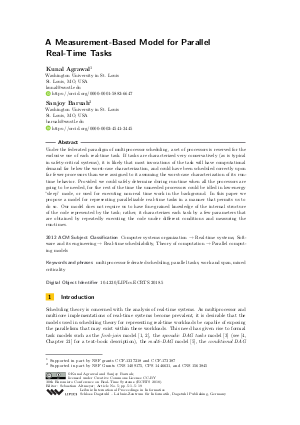A Measurement-Based Model for Parallel Real-Time Tasks
Authors
Kunal Agrawal  ,
Sanjoy Baruah
,
Sanjoy Baruah 
-
Part of:
Volume:
30th Euromicro Conference on Real-Time Systems (ECRTS 2018)
Part of: Series: Leibniz International Proceedings in Informatics (LIPIcs)
Part of: Conference: Euromicro Conference on Real-Time Systems (ECRTS) - License:
 Creative Commons Attribution 3.0 Unported license
Creative Commons Attribution 3.0 Unported license
- Publication Date: 2018-06-22
File

PDF
LIPIcs.ECRTS.2018.5.pdf
- Filesize: 0.53 MB
- 19 pages
Document Identifiers
Subject Classification
ACM Subject Classification
- Computer systems organization → Real-time systems
- Software and its engineering → Real-time schedulability
- Theory of computation → Parallel computing models
Keywords
- multiprocessor federated scheduling
- parallel tasks
- work and span
- mixed criticality
Metrics
- Access Statistics
-
Total Accesses (updated on a weekly basis)
0PDF Downloads0Metadata Views
Abstract
Under the federated paradigm of multiprocessor scheduling, a set of processors is reserved for the exclusive use of each real-time task. If tasks are characterized very conservatively (as is typical in safety-critical systems), it is likely that most invocations of the task will have computational demand far below the worst-case characterization, and could have been scheduled correctly upon far fewer processors than were assigned to it assuming the worst-case characterization of its run-time behavior. Provided we could safely determine during run-time when all the processors are going to be needed, for the rest of the time the unneeded processors could be idled in low-energy "sleep" mode, or used for executing non-real time work in the background. In this paper we propose a model for representing parallelizable real-time tasks in a manner that permits us to do so. Our model does not require us to have fine-grained knowledge of the internal structure of the code represented by the task; rather, it characterizes each task by a few parameters that are obtained by repeatedly executing the code under different conditions and measuring the run-times.
Cite As Get BibTex
Kunal Agrawal and Sanjoy Baruah. A Measurement-Based Model for Parallel Real-Time Tasks. In 30th Euromicro Conference on Real-Time Systems (ECRTS 2018). Leibniz International Proceedings in Informatics (LIPIcs), Volume 106, pp. 5:1-5:19, Schloss Dagstuhl – Leibniz-Zentrum für Informatik (2018)
https://doi.org/10.4230/LIPIcs.ECRTS.2018.5
BibTex
@InProceedings{agrawal_et_al:LIPIcs.ECRTS.2018.5,
author = {Agrawal, Kunal and Baruah, Sanjoy},
title = {{A Measurement-Based Model for Parallel Real-Time Tasks}},
booktitle = {30th Euromicro Conference on Real-Time Systems (ECRTS 2018)},
pages = {5:1--5:19},
series = {Leibniz International Proceedings in Informatics (LIPIcs)},
ISBN = {978-3-95977-075-0},
ISSN = {1868-8969},
year = {2018},
volume = {106},
editor = {Altmeyer, Sebastian},
publisher = {Schloss Dagstuhl -- Leibniz-Zentrum f{\"u}r Informatik},
address = {Dagstuhl, Germany},
URL = {https://drops.dagstuhl.de/entities/document/10.4230/LIPIcs.ECRTS.2018.5},
URN = {urn:nbn:de:0030-drops-89999},
doi = {10.4230/LIPIcs.ECRTS.2018.5},
annote = {Keywords: multiprocessor federated scheduling, parallel tasks, work and span, mixed criticality}
}
Author Details
Funding
- Agrawal, Kunal: Supported in part by NSF grants CCF-1337218 and CCF-173387
- Baruah, Sanjoy: Supported in part by NSF Grants CNS 1409175, CPS 1446631, and CNS 1563845
